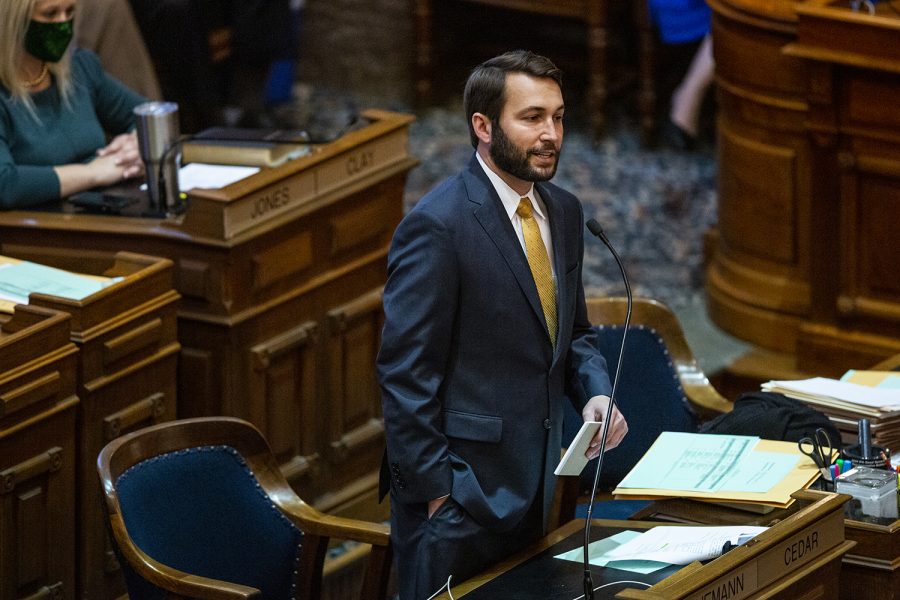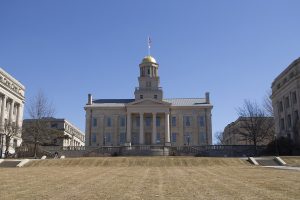University of Iowa College of Dentistry to alter approach to student speech
The college will prevent faculty from including political opinions in mass emails to students and review the punitive process for future student speech.
Rep. Bobby Kaufmann speaks during the opening of the 2021 legislative session on Monday, Jan. 11, 2021 at the Iowa State Capitol in Des Moines. Legislative goals for the session include further tax cuts, expanding in-person learning, and moving towards economic recovery from the COVID-19 pandemic.
February 7, 2021
The University of Iowa College of Dentistry will adjust its mass emailing practices after state lawmakers reprimanded representatives from Iowa’s three public universities last week for a history of actions Republican lawmakers said suppressed conservative voices.
In a statehouse committee meeting last week, UI College of Dentistry Dean David Johnsen told lawmakers he won’t allow College of Dentistry faculty to send mass emails to students that include political rhetoric.
Free-speech experts and advocates told The Daily Iowan that First Amendment concerns can often be thorny, but ultimately the purpose of public universities is to balance the protection of free speech with the fostering of a conducive learning environment for students of all backgrounds.
The UI College of Dentistry sent a mass email to its students in October 2020 condemning an executive order by former President Trump that prohibited federal agencies and institutions receiving federal grant money from providing students with diversity and equity training that “scapegoats” certain races or sexes.
Michael Brase, a dentistry student at the college, responded to the mass email directly within the thread, disagreeing with the college’s stance. When he was summoned to a disciplinary hearing from college administrators for “unprofessional behavior,” he sought help from Iowa legislators on the basis that his First Amendment rights were being violated.
“I don’t think that they should be sending out emails against or for Trump executive orders, or against or for Biden executive orders,” Rep. Bobby Kaufmann, R-Wilton, said in an interview with the DI. “I mean, the goal of the university is to educate, and so if they want to send out both sides and let students decide for themselves that’s one thing, but saying, ‘Hey I criticize this particular political notion’ … they said they would no longer be sending out emails like that.”
Johnsen, the dentistry college dean wrote in a statement to the DI that he will not use his voice in any official capacity when it comes to expressing political viewpoints.
A representative for the Foundation of Individual Rights in Education, a national organization that advocates for First Amendment rights on behalf of college students and faculty, said in a statement referring to the College of Dentistry’s handling of free speech that universities should not limit free speech discussion under the guise of professionalism.
“When university leaders open up campus discussions about political issues like the executive order, which FIRE criticized because of its potential threat to chill academic speech, they should not take steps to limit that discussion,” Adam Steinbaugh, director of FIRE’s Individual Rights Defense Program, said in the statement. “Unfortunately, we’ve too often seen ‘professionalism’ used as a pretext to investigate, discipline, or chill student speech on matters of public concern. Even if a student is not ultimately punished, summoning a student to a disciplinary hearing may have continuing consequences, as applying for licensure may require disclosure of investigations, as Iowa law appears to do.”
Kaufmann said Brase was faced with possible expulsion from the college as a result of his disagreement on the executive order, but Johnsen said during the committee meeting and later to the DI that Brase never faced academic punishment.
“The ultimate irony is the inappropriate conduct was responding to a mass email with political opinions when the initiator of the mass email with political opinions was the university,” Kaufmann said. “That kind of, you know, hypocrisy was shown, and the dean said, ‘Yes, and we apologize. We were wrong.’”
Public universities are required to obey the federal First Amendment in a way that private universities and other private institutions are not, UI College of Law Professor Todd Pettys told the DI in an interview.
“We’re obliged to honor freedom of speech by the Constitution, but it’s also absolutely central in our mission,” Pettys said of the university. “And that’s something that we and the state are right to keep a vigilant eye on, because it’s very important. Whether we’re constitutionally obliged to do it or not, these things are at the heart of what it means to be a modern university.”
Pettys pointed to institutes like the University of Chicago. Despite being a private university not bound to the First Amendment, it published “The Chicago Statement” emphasizing the value of free speech in educational institutions.
According to FIRE, Iowa’s state Board of Regents adopted The Chicago Statement in 2019.
“You’ll see some language in there, a paragraph or two, that says if you’re trying to advance the ball of knowledge and you’re trying to pursue truth and value and find out what’s important and what’s not, there can’t be any orthodoxy,” Pettys said. “People have got to be free to question anything, to propose anything, and to argue anything. Then others have the opportunity to respond, and that’s how universities help society find its way forward.”
FIRE uses a traffic-light system to rate educational institutions based on how friendly school policy is to the protection of free speech, with a green light representing no policy that clearly restricts free speech and a red light signifying that at least one school policy seriously restricts free speech.
The UI currently has a yellow-light rating, meaning the school has at least one policy ambiguous enough to not fully protect free speech.
American Civil Liberties Union Iowa Communications Director Veronica Fowler said racial-justice issues and free speech don’t need to be mutually exclusive but require thoughtful solutions that don’t rely on political perspective.
“Universities have to balance two really important things,” Fowler said. “On one hand, they have to preserve free speech of faculty and of students, and they are a government entity, so unlike a private college, the First Amendment applies. But they also have a legal obligation, not to mention a moral obligation, to create a place where people from all backgrounds particularly those that have been historically discriminated against, can go and learn.”
Representatives heard from all three state universities during the hearing, with each school acknowledging past issues related to the protection of student First Amendment rights, or lack thereof.
Rep. Steve Holt, R-Denison, said a possible next step in terms of legislation that would further protect speech on college campuses would be to end tenure for professors who try to limit student free speech. He introduced a tenure-ban bill that higher-education advocates say would be devastating for faculty retention, driving away quality faculty to universities that do offer job security.
Rep. Lindsay James, D-Dubuque, said the other side of the argument, the liberal student voices that are being discussed, have not been heard throughout the conflict at the college and Statehouse. She said she wants to hear from one of the other students involved, specifically a student of color, and made the request that it be done.
“It has been brought to my attention that this other group also felt fear and they also felt harmed,” James said. “We have a situation in front of us. Our country is incredibly polarized.”
James said she questions whether this is a topic her committee should even be discussing, and if instead it should simply be an example to young people on how to come together despite differing opinions.
“We have an opportunity to bring healing and reconciliation and help you learn the skills to talk to one another and work through these things,” James said.
In November, Iowa State University made changes to its syllabus requirements that included a specific statement about upholding the First Amendment protection of freedom of speech and the principle of academic freedom.
This rule was made after an Iowa State professor barred her students from submitting material that ideologically opposed Black Lives Matter, gay marriage, and abortion rights.
In 2019, Iowa Gov. Kim Reynolds, a Republican, signed a bill into law that requires all public universities and community colleges to respect free speech. The bill came after an openly gay UI student was barred from a leadership position in a Christian group on campus, and the UI revoked the group’s status as a registered organization. Republicans used this as an example of how universities suppress free speech, and Democrats say the bill Reynolds’ signed still leaves room for discrimination.
All three universities were given a month to collect more information about how they plan to commit to the free speech bill and how they will combat accusations of repressing speech.
Johnsen said that he has been reviewing the situation since October and evaluating parts of the process that worked or didn’t work. He plans to implement steps to ensure a situation similar to this doesn’t happen again.
The first step, Johnsen said, is to commit to not using his own voice in an official capacity to discuss political topics. He said the second step is to revisit, restructure, and rebuild the Collegiate Academic and Professional Performance Committee.
“As a college we fervently believe that free speech is critical to the academic experience,” Johnsen said, “and, without the ability to engage freely, our mission of delivering health care would be compromised.”






